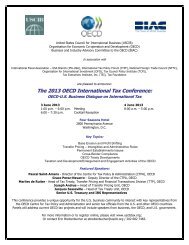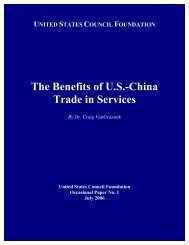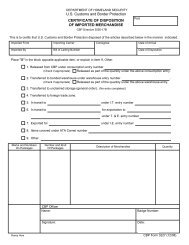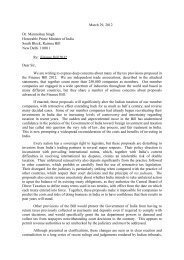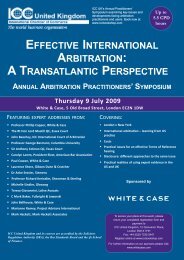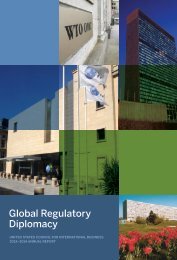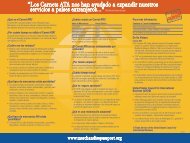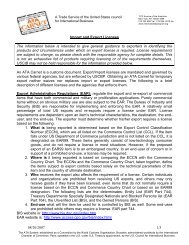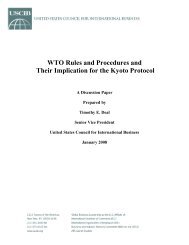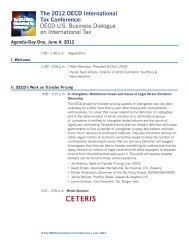Importer Security Filing (“10+2”) – From Delayed Enforcement to ...
Importer Security Filing (“10+2”) – From Delayed Enforcement to ...
Importer Security Filing (“10+2”) – From Delayed Enforcement to ...
Create successful ePaper yourself
Turn your PDF publications into a flip-book with our unique Google optimized e-Paper software.
<strong>Importer</strong> <strong>Security</strong> <strong>Filing</strong> (<strong>“10+2”</strong>) <strong>–</strong> <strong>From</strong> <strong>Delayed</strong><strong>Enforcement</strong> <strong>to</strong> Graduated <strong>Enforcement</strong>By Bruce H. Leeds, Esq., Braumiller Schulz LLP(bruce@globaltradelaw.net)Web site: www.globaltradelaw.netThe one year period of delayed enforcement of the <strong>Importer</strong> <strong>Security</strong> <strong>Filing</strong> (ISF) will end onJan. 26, 2010 and enforced compliance of the requirement will commence.US Cus<strong>to</strong>ms & Border Protection (CBP) has unveiled its strategy for graduated enforcement ofthe ISF. <strong>Enforcement</strong> will be tightened up in phases during the year. Each 3-month quarter of2010 will mark a new phase of ISF enforcement.During the first quarter of 2010, CBP will moni<strong>to</strong>r the ISF filings, noting the importers that arefiling and those who are not. The agency will also moni<strong>to</strong>r the completeness and accuracy ofthe ISF filings. CBP will notify companies that are not filing or that have errors or discrepanciesin their filings and work with them <strong>to</strong> bring their ocean imports in<strong>to</strong> compliance. <strong>Importer</strong>s notfiling ISFs may also anticipate that their imports will be subject <strong>to</strong> further scrutiny, with CBPcalling for document reviews, non-intrusive inspection or intensive examination of the cargo.In the second and third quarters of 2010 CBP will ramp up enforcement of the ISF requirement.<strong>Importer</strong>s not filing ISFs or having serious errors or discrepancies in their ISF filings cananticipate having their ocean imports delayed and held for examinations.CBP does not intend <strong>to</strong> issue penalties or liquidated damages assessments for ISF violationsoccurring during the first three quarters of 2010 or for transactions occurring prior <strong>to</strong> the Jan. 26enforcement date. An exception <strong>to</strong> this would be for fraud, smuggling, or terrorism connectedwith ocean imports or egregious violations of the ISF requirement.CBP is clear, though, in saying that they really want the data and not penalties. CBP also saysthey do not want <strong>to</strong> disrupt the flow of legitimate cargo in<strong>to</strong> the US. The primary intent is <strong>to</strong> usean informed compliance approach <strong>to</strong> bring importers in<strong>to</strong> compliance with ISF filingrequirements.Starting in the fourth quarter of 2010 (Oct. 1, 2010), CBP will begin issuing liquidated damages(penalties) for ISF violations. Proposed assessments of liquidated damages will be initiated atthe ports of entry. The proposed assessments will first be routed <strong>to</strong> CBP Headquarters forreview. The intent is <strong>to</strong> ensure that ISF liquidated damages assessments will be handled in auniform manner across the country. CBP Headquarters will approve the assessment or makeother recommendations for disposition of the matter and send the proposed assessments back<strong>to</strong> the originating ports. If approved by Headquarters, the ports will then issue the ISF liquidateddamages notices <strong>to</strong> the importers. <strong>Importer</strong>s will deal with the ports of entry for payment or
mitigation of the ISF liquidated damages. This approach will be used for at least the first year,after which it could be extended or full responsibility for ISF liquidated damages assessmenttransferred back <strong>to</strong> the ports of entry.Finally, the Final Rule on ISF has not been published. It is not known at this time when that willoccur or whether CBP will solicit further comments on the ISF regulations. In drafting the FinalRule, CBP may take in<strong>to</strong> account its experience with the ISF during the delayed enforcementperiod and the first parts of graduated enforcement.



